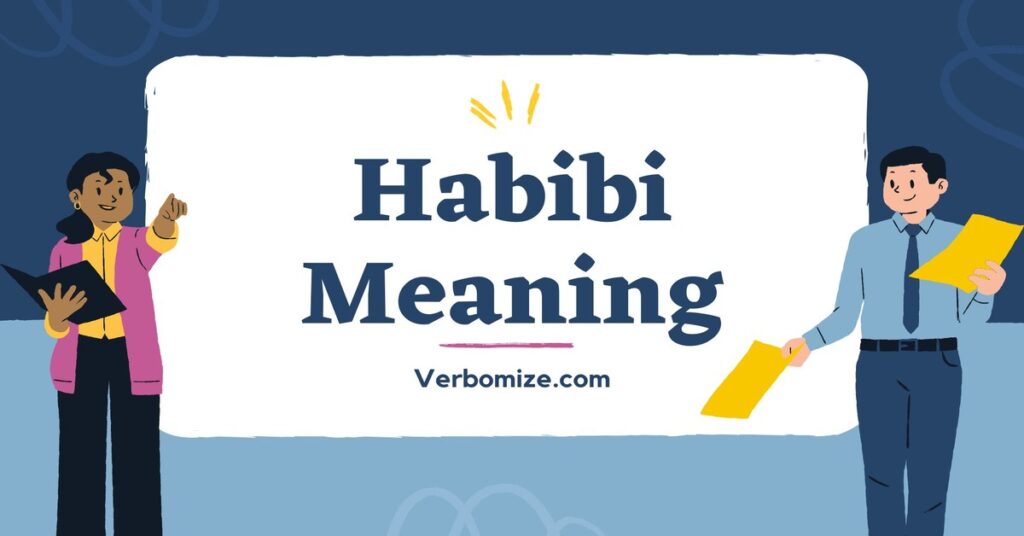Habibi meaning is a term that’s likely caught your attention, whether through music, social media, or conversations with friends. But what exactly does it mean, and why is it so widely used across cultures? In this article, we’ll dive into the emotional depth and rich cultural significance of Habibi, exploring how this simple word carries so much warmth and affection.
From its Arabic origins to its global spread, Habibi is more than just a term of endearment—it’s a symbol of love and connection. Stick with us as we unpack its meanings, how to use it, and when it’s best to embrace this beautiful word in conversation.
What Does ‘Habibi’ Really Mean?
At its essence, “Habibi” means “my dear,” “my love,” or “my darling” in Arabic. It’s a term of affection used to express love, care, and warmth toward someone close to you.
The Emotional Weight of ‘Habibi’
In Arabic, the word Habibi holds an emotional significance that goes beyond just “love.” It represents a sense of deep affection and closeness. People use it to address family, friends, romantic partners, or even pets, depending on the context. While the literal translation is “my beloved,” the deeper meaning is tied to emotional warmth and intimacy.
- Context: When used among close friends or family, Habibi reflects a warm, loving relationship. In a romantic context, it conveys passionate affection.
- Tone: The tone in which it’s said can greatly affect its meaning. When spoken with tenderness, it can communicate deep emotional affection, while a casual use among friends can just imply fondness.
The Fascinating Origins of ‘Habibi’
The word Habibi is derived from the Arabic root “Hababa”, which means “to love” or “to be loved.” This root gives rise to various terms of affection in Arabic, such as “Habibti” (the feminine form of Habibi) and “Habib” (which can also refer to a male lover or friend).
Historical and Linguistic Roots
The word has ancient roots in the Arabic language, dating back to early Arabic poetry and literature, where terms of endearment like Habibi were often used to express admiration, love, and affection.
- Arabic Dialects: Habibi is widely used in Arabic dialects across various regions, including the Middle East and North Africa. In some dialects, such as Egyptian Arabic, it’s used more casually and frequently, even among friends.
- Cross-Cultural Influence: Habibi has also crossed cultural boundaries, especially through modern media, pop culture, and music. Artists, particularly in the Middle East, frequently use the word in their songs, making it familiar to a global audience.
The Global Spread of ‘Habibi’
While Habibi has roots in Arabic-speaking countries, its usage has spread far beyond the Middle East and North Africa. Thanks to globalization, social media, and pop culture, people worldwide have adopted Habibi into their everyday vocabulary.
Popularity in Western Media and Social Media
With Arabic music becoming more popular globally and social media platforms like Instagram and TikTok making it easy to share language and culture, Habibi has found a home in international conversations. Celebrities, influencers, and even non-Arab speakers often use the term casually, introducing it to a global audience.
- Music: Songs by artists like Amr Diab, who frequently uses Habibi in his music, have further solidified the word’s place in pop culture. Lyrics like “Ya Habibi, I love you” have made Habibi synonymous with love and affection in mainstream media.
- Social Media: Habibi is commonly found in captions, comments, and hashtags across platforms like Instagram and Twitter. It’s often used in a light-hearted or playful manner, further demonstrating its versatility as a term of endearment.
Understanding the Cultural Weight Behind ‘Habibi’
In Arabic-speaking cultures, Habibi isn’t just a word; it’s a reflection of deep emotional connection. It represents a way of showing closeness, respect, and affection within families, friendships, and romantic relationships.
Habibi in Family and Friendship Contexts
In many Arabic cultures, Habibi is used among family members to show love and tenderness. It’s a way to express familial warmth, particularly in close-knit families where affection is regularly exchanged.
- Parents to Children: Parents often use Habibi to address their children, particularly when offering care or affection.
- Friends: Close friends use Habibi to show love and camaraderie. It’s common to hear it among friends in casual, playful conversations.
Habibi in Romantic Relationships
The word is perhaps most associated with romantic love, used to express longing, passion, and tenderness toward a partner. Whether in love letters, poems, or casual conversation, Habibi embodies the affectionate bond between lovers.
- Emotional Connection: When spoken in a romantic setting, Habibi communicates deep emotional affection, often signifying that someone is cherished and loved.
Common Synonyms and Alternatives to ‘Habibi’
Habibi is part of a broader family of terms used to express affection across Arabic-speaking countries. Here are some common synonyms and alternatives:
- Habibti – The feminine form of Habibi, meaning “my dear” or “my darling” (used for females).
- Amor – Spanish for “love,” commonly used in similar ways to Habibi in non-Arabic cultures.
- My Love – A straightforward English alternative that conveys a similar sense of affection.
- Sweetheart – Another endearment term used in English-speaking cultures.
Regional Variations
Arabic dialects have regional variations of Habibi, such as:
- Hubb (حب) – A general term for “love” used across various dialects.
- Qalbi (قلبي) – Meaning “my heart,” often used in place of Habibi in certain regions.
The Opposites of ‘Habibi’: Antonyms Explained
Understanding Habibi isn’t complete without exploring its antonyms, or terms that signify the opposite meaning. Here are some words that could serve as antonyms in certain contexts:
- Ajanbi (أجنبي) – Meaning “foreigner” or “stranger,” often used to describe someone who isn’t a close or loved person.
- Adou (عدو) – Meaning “enemy,” used to describe someone with whom you have a hostile relationship.
Who Uses ‘Habibi’ and Why It’s So Popular
Habibi is not limited to a specific demographic. It spans different age groups, genders, and social circles. Here’s a breakdown of who typically uses Habibi and why it resonates so widely:
In Romantic Relationships
- Couples use Habibi to express romantic love and affection.
Among Friends
- Close friends may use Habibi casually, signifying warmth and camaraderie.
In Family
- Parents and children often use Habibi to express love in a familial setting.
Non-Arabic Speakers
- Non-Arab speakers might use Habibi due to exposure to Arabic music or media, adopting the term in a playful or affectionate way.
Exploring the Many Meanings of ‘Habibi’ and How to Use Them
Habibi is a versatile and beloved term of endearment in Arabic-speaking cultures. Whether used to express love, affection, or even friendly camaraderie, the word has a rich emotional context. Let’s dive into the various meanings of Habibi and how these expressions can be used in different situations.
Habibi Meaning in English
- Meaning: Habibi translates to “my love” or “my dear” in English.
- How to Use: This term is often used with loved ones, friends, or partners in casual and intimate settings.
- Example: “Thank you for being there, Habibi.”
Habibi Meaning
- Meaning: In Arabic, Habibi means “my beloved” or “my dear,” used to express affection.
- How to Use: Habibi can be used in both romantic and platonic contexts, from a parent to a child or between close friends.
- Example: “Habibi, I’m so excited to see you again!”
Yalla Habibi Meaning
- Meaning: Yalla Habibi roughly translates to “Come on, my dear” or “Let’s go, my love.”
- How to Use: This phrase is often used to encourage someone or urge them to hurry up in a playful or affectionate manner.
- Example: “We’re late! Yalla Habibi, let’s go!”
Habibi Meaning in Hindi
- Meaning: In Hindi, Habibi means “मेरा प्यार” (Mera Pyar), which translates to “my love” or “my dear.”
- How to Use: It can be used just as it is in Arabic, showing affection between close people.
- Example: “मुझे तुम्हारा साथ बहुत अच्छा लगता है, Habibi।” (I really enjoy your company, Habibi.)
Habibi Meaning to a Girl
- Meaning: When used to a girl, Habibi (or Habibti, the feminine form) means “my darling” or “my dear.”
- How to Use: Habibti is the preferred form when addressing a woman, but Habibi can still be used in a loving or respectful manner.
- Example: “Habibti, you look beautiful today!”
Ya Habibi Meaning
- Meaning: Ya Habibi translates to “Oh, my love” or “Oh, my dear,” often used to express excitement, affection, or even mild frustration.
- How to Use: This phrase is usually spoken when you want to call someone’s attention in a tender manner.
- Example: “Ya Habibi, you won’t believe what just happened!”
Wallah Habibi Meaning
- Meaning: Wallah Habibi means “I swear, my dear” or “I swear, my love.” The term Wallah is used to emphasize truth or sincerity.
- How to Use: You can use this phrase when you want to assure someone of your honesty or to add emphasis to your words.
- Example: “Wallah Habibi, I didn’t know it was your birthday!”
Shukran Habibi Meaning
- Meaning: Shukran Habibi translates to “Thank you, my dear.”
- How to Use: It is used to express gratitude towards someone you care about or who has helped you.
- Example: “Shukran Habibi for your kind gesture.”
Habibi Meaning in Islam
- Meaning: In Islam, Habibi is a term used to express affection or endearment towards close ones, particularly in personal relationships.
- How to Use: While Habibi is not specifically tied to religious practice, it is used frequently to show love or affection between people.
- Example: “In the Islamic tradition, calling someone Habibi reflects love and closeness.”
Hamood Habibi Meaning
- Meaning: Hamood Habibi refers to “Hamood, my dear.” This is often used humorously or playfully, popularized by internet memes and songs.
- How to Use: It’s used in a fun or light-hearted way, often seen in viral content.
- Example: “Check out this funny video of Hamood Habibi!”
Habibi Meaning Slang
- Meaning: In modern slang, Habibi can be used in a playful or casual way, even among strangers, though still implying affection.
- How to Use: While it may carry an affectionate tone, it’s used more loosely in informal settings, especially among younger people or in social media.
- Example: “Hey Habibi, what’s up?”
My Habibi Meaning
- Meaning: My Habibi is a possessive form that translates to “My love” or “My darling,” emphasizing a deep, personal connection.
- How to Use: This can be used in intimate settings or to show emotional closeness.
- Example: “You’re constantly in my thoughts, My Habibi.”
Yalla Habibi Meaning in English
- Meaning: The phrase Yalla Habibi means “Come on, my love” or “Let’s go, my dear” in English.
- How to Use: It’s commonly used to encourage someone to hurry up or join in something, often in a playful tone.
- Example: “Yalla Habibi, let’s hit the road before it gets too late.”
Marhaba Habibi Meaning
- Meaning: Marhaba Habibi means “Hello, my dear” or “Welcome, my love.”
- How to Use: This is a warm greeting, often used to welcome someone or show affection when meeting them.
- For example: “Marhaba Habibi, it’s such a joy to see you!”
Habibi Meaning Arabic
- Meaning: Habibi in Arabic means “my beloved” or “my dear.” It’s a widely used term of endearment.
- How to Use: It is used across various Arab cultures to express love and affection.
- Example: “Habibi, you are my best friend.”
Wallah Habibi Meaning in Arabic
- Meaning: Wallah Habibi in Arabic means “I swear, my dear.” The term Wallah adds sincerity to the statement.
- How to Use: You use this phrase to confirm your honesty or when speaking earnestly.
- Example: “Wallah Habibi, I didn’t mean to upset you.”
Habibi Meaning in Urdu
- Meaning: In Urdu, the word “Habibi” shares the same meaning as in Arabic, translating to “my love” or “my dear.”
- How to Use: It’s used among close relationships, such as family and friends, to convey affection.
- Example: “تم ہمیشہ میری مدد کرتے ہو، Habibi۔” (You always help me, Habibi.)
Assalamualaikum Habibi Meaning
- Meaning: Assalamualaikum Habibi translates to “Peace be upon you, my dear” in Arabic, with Habibi adding an affectionate touch to the greeting.
- How to Use: This phrase is used to greet someone warmly, combining the traditional Islamic greeting with a term of endearment.
- Example: “Assalamualaikum Habibi, I hope you’re doing well!”
When Should You Use ‘Habibi’? The Do’s and Don’ts
Understanding the appropriate context for Habibi is crucial. Using it without considering the relationship you have with the person and the situation could lead to awkwardness or misunderstandings.
Do’s:
- Use Habibi with loved ones, close friends, or family members.
- Say Habibi in informal, intimate settings where affection is the focal point.
- Use Habibi in the context of Arabic media, where it’s often used in music and movies.
Don’ts:
- Avoid using Habibi in professional or formal settings unless you have an established personal relationship with someone.
- Be mindful of cultural boundaries, especially when addressing someone from a different culture who might not be familiar with the term.
- Avoid using it as a casual expression with people you don’t know well, especially in non-Arab cultures.
Speaking ‘Habibi’ Responsibly: Respect and Sensitivity
While Habibi is a beautiful expression of affection, it’s essential to use it with cultural sensitivity and respect. In some contexts, it can be seen as disrespectful if used casually or without understanding its cultural significance.
Mindful Communication
- Always consider the tone and relationship you have with the person you are addressing.
- In non-Arabic speaking cultures, using Habibi without proper context can sometimes be seen as cultural appropriation or mimicry, so use it thoughtfully.
Final Thoughts: Why ‘Habibi’ Resonates So Deeply
The word Habibi transcends language and culture, offering a simple yet profound way to express love, care, and affection. Whether you’re speaking it to a loved one, singing it in a song, or posting it on social media, Habibi serves as a beautiful reminder of the power of words to connect us emotionally.
Incorporating terms of endearment like Habibi into conversations is more than just using a word—it’s about fostering closeness and understanding in relationships, no matter where you’re from or who you’re speaking to.
Frequently Asked Questions About ‘Habibi’
What does ‘Habibi’ mean in Islam?
In Islam, Habibi can express affection for a loved one, whether family, friends, or a spouse. It’s a term of endearment used among close people, and it’s not specifically tied to religious practices.
Can ‘Habibi’ be used for a girl?
Yes, Habibi can be used for a girl, but the feminine form Habibti is more common in addressing females. Both mean “my dear” or “my love.”
What is the meaning of ‘Yalla Habibi’?
Yalla Habibi roughly translates to “Come on, my dear” or “Let’s go, my love.” It’s a playful or encouraging phrase used to get someone’s attention or to urge them to move faster.

Jone Smith is an experienced blogger and content creator behind Verbo Mize. With a passion for storytelling and insightful commentary, Jone brings a wealth of knowledge on diverse topics. His expertise in blogging, combined with a keen eye for detail, makes his work both informative and engaging, offering readers valuable perspectives on a wide range of subjects.







